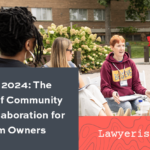
My recent petition to the American Bar Association, called for a fundamental shift in language within the legal profession, urging the cessation of the term “nonlawyer.” This initiative sparks a crucial conversation about inclusivity and professional identity within legal ecosystems. In this article, I explore the depths of this linguistic transformation with Sonja Ebron, CEO of Courtroom5. Her insights illuminate the significant and sometimes overlooked roles played by those not traditionally licensed to practice law but who are pivotal in the legal process. Ebron helps us understand how the term “nonlawyer” perpetuates an unnecessary exclusivity within the profession and how rethinking this terminology can lead to more inclusive, equitable legal practices. As we delve deeper into this conversation, it becomes clear that words do more than label; they shape perceptions of gatekeeping professions and can either hinder or enhance the justice process. This discussion with Ebron is a critique and a call to action for embracing inclusivity through our language and practices in the legal field.
Olga V. Mack: How does the term nonlawyer perpetuate exclusivity within the legal profession, and what are the potential consequences of this exclusionary language?
Sonja Ebron: Nonlawyer suggests that legal work is performed only by lawyers, assisted in undefined ways by undefined others, and that efforts performed by other legal professionals to resolve legal problems do not constitute legal work. This is false. The consequence of this lie is that people with legal problems who cannot retain a lawyer (the overwhelming majority of people with legal problems) seek solutions outside the legal system, to the detriment of the system and our society.
OM: What alternative language or terminology do you propose to replace nonlawyer, and how might this shift contribute to a more inclusive legal ecosystem?
SE: We can and should retain lawyers’ special and unique status without narrowing the definition of their work in any way. We should refer to other legal professionals in ways that speak to their functions. Paralegals, justice workers, and others have specific roles vis-à-vis legal work. Finding the right language requires us to better define categories of legal tasks alongside the skills and training needed to accomplish them.
OM: What role do you believe the term justice workers plays in reshaping perceptions of individuals who contribute to the legal system but may not hold traditional legal credentials? How does it differ from the term nonlawyer in its implications and inclusivity?
SE: Justice workers are people trained to assist individuals in handling simple legal matters where lawyers and lawyer supervision are not strictly required, such as landlord-tenant disputes and uncontested bankruptcies. I love the term because it speaks more to the work these professionals do in clearing a path to justice for people handling their own legal affairs and less to a hierarchy within the profession. The term is welcoming and encouraging to people seeking help. A properly trained justice worker would comfort someone struggling to answer an eviction filing.
OM: As the CEO of Courtroom5, what specific challenges have you observed for individuals who are not formally trained as lawyers but navigate legal processes? How does language play a role in these challenges?
SE: Our customers are pro se litigants handling serious claims like home foreclosure and wrongful termination. Throughout their cases, they have a lot to learn in a hurry. Our commitment at Courtroom5 is to ensure they can evaluate procedural options at each step, support the legal elements of claims and defenses in the case, find helpful legal authority for their arguments, and draft effective legal documents, all with minimal legalese. Our technology distributes legal information just in time to enable good decisions while avoiding overwhelm. We employ and train paralegal “coaches” to help customers find information when they’re stuck. We’ve found that referring to these professionals by their coaching function helps them and our customers perform better.
OM: Beyond language, what other structural or systemic changes are necessary to foster greater inclusivity and accessibility within legal ecosystems?
SE: We must recognize that the primary user of our civil justice system is pro se, often competing with a represented opponent, and this isn’t likely to change. These users need legal services for meaningful access to the system. Lawyers have a monopoly on delivering legal services, but the costs are out of reach for most people who need them.
We cannot maintain a democracy where access to a branch of government costs a middle-class annual salary. So, we have to find a way to lower the costs of legal services with justice technologies, limited-scope services, allied legal professionals, or combinations of these. The fundamental transformation is to make full representation a nice-to-have rather than a must-have.
OM: As a leader in legal tech, how do you see technology intersecting with the movement toward inclusive language and practices within the legal profession?
SE: Those in justice tech, or legal tech for legal consumers, are incentivized to make our solutions easy to use and understand. It’s important to use plain language and small descriptions wherever possible. Technology, particularly well-trained generative AI, makes this more available than ever.
In closing, the conversation with Sonja Ebron compels us to reflect deeply on the power of language as a construct that shapes our professional landscapes and societal norms. The term nonlawyer does more than mislabel — it marginalizes a swath of professionals whose contributions are indispensable to the functioning of our legal system. As we push for linguistic shifts, we are invited to ponder larger questions: What hierarchies do we reinforce through our professional vernacular? How do these designations affect the pursuit of justice and the public’s trust in legal processes?
By adopting terms like justice workers, we affirm the value of these roles and challenge the traditional narratives of authority and expertise in the legal field. This is not merely a call to change terminology but to reconsider the power structures within the legal profession. Are we ready to reimagine a legal landscape that truly serves all, and if so, how far are we willing to go to dismantle the existing barriers? This conversation is just the beginning.
 Olga V. Mack is a Fellow at CodeX, The Stanford Center for Legal Informatics, and a Generative AI Editor at law.MIT. Olga embraces legal innovation and had dedicated her career to improving and shaping the future of law. She is convinced that the legal profession will emerge even stronger, more resilient, and more inclusive than before by embracing technology. Olga is also an award-winning general counsel, operations professional, startup advisor, public speaker, adjunct professor, and entrepreneur. She authored Get on Board: Earning Your Ticket to a Corporate Board Seat, Fundamentals of Smart Contract Security, and Blockchain Value: Transforming Business Models, Society, and Communities. She is working on three books: Visual IQ for Lawyers (ABA 2024), The Rise of Product Lawyers: An Analytical Framework to Systematically Advise Your Clients Throughout the Product Lifecycle (Globe Law and Business 2024), and Legal Operations in the Age of AI and Data (Globe Law and Business 2024). You can follow Olga on LinkedIn and Twitter @olgavmack.
Olga V. Mack is a Fellow at CodeX, The Stanford Center for Legal Informatics, and a Generative AI Editor at law.MIT. Olga embraces legal innovation and had dedicated her career to improving and shaping the future of law. She is convinced that the legal profession will emerge even stronger, more resilient, and more inclusive than before by embracing technology. Olga is also an award-winning general counsel, operations professional, startup advisor, public speaker, adjunct professor, and entrepreneur. She authored Get on Board: Earning Your Ticket to a Corporate Board Seat, Fundamentals of Smart Contract Security, and Blockchain Value: Transforming Business Models, Society, and Communities. She is working on three books: Visual IQ for Lawyers (ABA 2024), The Rise of Product Lawyers: An Analytical Framework to Systematically Advise Your Clients Throughout the Product Lifecycle (Globe Law and Business 2024), and Legal Operations in the Age of AI and Data (Globe Law and Business 2024). You can follow Olga on LinkedIn and Twitter @olgavmack.
#Justice #Workers #Pioneering #Inclusivity #Nonlawyer #Label #Law










